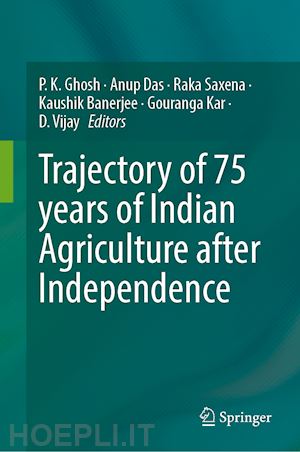DR. P K GHOSH working as Founder Director and Vice Chancellor, ICAR-National Institute of Biotic Stress Management (NIBSM), Raipur, earlier demonstrated leadership as National Coordinator, National Agricultural Higher Education Project -World Bank aided project, ICAR, New Delhi, Director, Indian Grassland and Fodder Research Institute, Jhansi and Head, Crop Production Division, Indian Institute of pulses Research. His pioneering works are on climate change, carbon sequestration, Resource use efficiency, conservation agriculture, crop diversification, soil water conservation, Integrated Farming System . He has been identified as one of the two percent of agricultural scientists at global level and Member, Royal Society of Research, London. He is recipient of 19 national awards including M.S. Randhawa Memorial Award for best Administration and also Fellow of National Academy of Sciences, India and National Academy of Agricultural Sciences (NAAS), and three professional society. He served as Chairman by organizing 23rd International Grassland Congress (IGC) held first time in India, executive member of IGC continuing committee representing South-East Asia, Sectional President, Agricultural section of Indian Science Congress. Editor-in-chief, National Academy of Science, India. Considering his academic, administrative and research excellence he was selected as co-opted member of DFI Committee, constituted by PMO and contributed to bring 14 volumes on DFI. He also formulated four policy papers for the country. He published 20 books and 167 research papers in the high impact factor journals with the total citation of 7947, h-index of 40 and i-10 index of 90 and total publication of 304.
DR. ANUP DAS is presently serving as Principal Scientist (Agronomy) at ICAR Research Complex for NEH Region, Tripura Centre, India. His extensive research works led to development of package of practices for no-till production of pulses and oilseeds in rice and maize fallow areas; organic production packages of 33 important crops on cropping system approach; standardization of Modified System of Rice Intensification and Raised and Sunken Bed land configuration, watershed based Integrated Farming System models, produce quality, input use efficiencies, soil properties and C-pools under different land uses and management practices. He has guided/ co-guided 17 masters and two Ph.D students and taught 6 courses to PG students. He has published 200 research articles, 74 books, compendium & technical bulletins, and many other documents with total citation of 4000 and h-index of 36 in his credit. He is actively involved in technology transfer for livelihood improvement of farmers through large scale capacity building programme and demonstrations benefitting about 50,000 farmers in north east India. He has received several National awards like ICAR-Lal Bahadur Shastri outstanding young scientist award, Swami Sahajanand Saraswati outstanding extension scientist award, Fakhruddin Ali Ahmed award for improving tribal farming system, ICAR-Inter-disciplinary team research award in natural resource management and First Dr. H.K. Jain – CAU, Imphal Award for research excellence in north east India among many others. Dr. Das is recipient of the prestigious Fellowships of National Academy of Agricultural Sciences (2019), Indian Society of Agronomy (2017), Indian Association of Hill Farming (IAHF-2017) and Society for Biotic and Environmental Research (2020).
DR RAKA SAXENA is currently working as a Principal Scientist at ICAR-National Institute for Agricultural Economics and Policy Research (NIAP), located in New Delhi, India. Her areas of interest in research include agricultural trade, animal science, and agricultural economics. She has more than 15 years of research experience and has published more than 50 papers in prestigious publications on anational and worldwide scale. In addition, she has written more than 20 book chapters and eight policy papers, briefs, and working papers. She has contributed via innovative, multi-disciplinary, and multi-institutional initiatives that are founded on evidence-based policy insights. She maintained her research agenda with a focus on the urgent need for prioritizing and evaluating agricultural research in order to directly benefit the nation's farmers. She focused on two important aspects of the country's agriculture, notably those that dealt with market intelligence for handling price volatility and enhancing farmers’ incomes. Her most recent study focuses on methods for maximizing the potential of the agricultural trade to raise farm incomes.
DR. GOURANGA KAR is presently the Director of ICAR-Central Research Institute for Jute and Allied Fibres (ICAR-CRIJAF), Barrackpore. Earlier he served as Principal Scientist, ICAR-Indian Institute of Water Management, Bhuba











